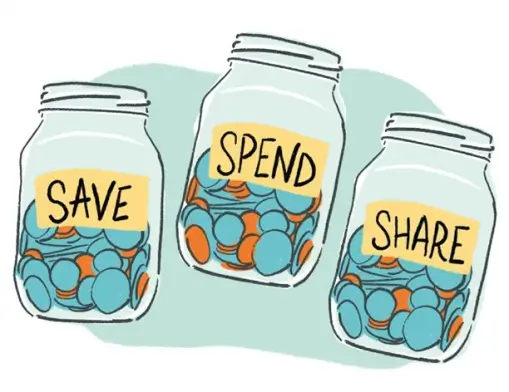
Did You Know?
Saving money is one of those things that can be hard. People think saving means giving something up. People think saving all requires sacrifice. Also, it doesn’t have to be hard. Saving money is also very rewarding. It’s not always big changes. It could be small, smart habits. You can build wealth over time. You just need a plan. Now, let’s examine six straightforward suggestions. So, you can start saving today.
1. Automate Your Savings
This is one of the best options for a first step. You are taking yourself out of the decision-making process. All you do is set up the automatic transfer. Each payday, you transfer a small amount into savings. You won’t even notice the missing funds. This is referred to as “paying yourself first.” When you do this, saving becomes easier and consistent. There is no option to spend it. It ensures you save before you pay anything else. So, this method allows your savings to grow without you thinking about it. You just formed a strong habit.
Read more: The Reality of Our Pursuit of Money

2. Develop a Transparent Budget
A budget is a spending plan. It is not a restriction. It is the visibility of where your money goes. This is empowerment. You can see what your income is. You can see everything you spend money on. This will help you locate extra cash. You will find discretionary expenditures. You can also monitor your success. A budget is a force. Hence, it enables you to set intentions or goals. It allows you to stay focused. Also, it gives you financial awareness. Therefore, it ultimately enables your savings.
3. Cancel Unused Subscriptions
Many people have hidden expenses or costs. They are paying for things that they are not using or are not benefiting from. They are paying for subscriptions. It may be a gym membership. It may be a streaming service. Or, it may be an app. Look at your bank statements. Identify small recurring charges or subscription fees. They can accumulate. Cancel the ones you are not using. This can generate savings very quickly.Hence, this will generate cash for your goals.
4. Prepare Food at Home
Eating out is expensive. It’s easy to blow money. Meal planning can help you save. Plan out meals for the week. Make a shopping list. Buy only what you need. This potential for buying too much food is limited. It will help control impulse buys. It reduces a lot of waste. It’s healthier too. Cooking your meals at home can be fun! It saves you a lot of money. The savings add up quickly! It makes a difference.
5. Pay Attention to Your Debt
High-interest debt is expensive. It is difficult to save when so much money goes to interest payments. This causes your progress to stall. Make a plan to pay the debt. Pay off the highest debt first. This saves you a lot of money in the long run. You will get more money back! This money can go into your savings. Getting out of debt is a great feeling. It gives you financial freedom. So that is a very good decision. It is also an important step to saving.

6. Mindful Spending
This is a strong psychological tool. Mindful spending means being mindful of how you spend your money. Ask yourself questions. Do I need it? Will it make me happy? Can I buy it later? This prevents impulse purchases. It allows you to see what is valuable to you. It stops you from spending just to feel better. Also, it allows you to make thoughtful choices. It allows for fewer regrets. Moreover, it puts you in charge of your spending. It honors your effort.
The Psychological Aspect of Saving
Saving is not just numbers. It is also in your head. We are wired in our brains to receive an instant reward. We want things right now. This causes a significant problem for saving. Our brains do not easily visualize our “future self.” Psychologists state that our future self feels like a different person. Today we spend money. Today, we forget about our future needs. When subjects visualize their future self, they save money. When you visualize future goals, you can see them clearly when you see the reward. It helps you overlook that instant desire to receive the pleasure of spending money.
Additionally, the process of saving money itself has some significant psychological benefits. A 2025 study coming from the University of South Australia found that people who manage their money well, including regularly saving, have better mental health. They also reported higher levels of energy, and more significant medial and emotional stability in their relationships, and better conflict resolution skills. Savings lowers your levels of stress and anxiety. Also, it gives you a sense of security and control (the feeling of being in control has valuable elements). A small piece of mind can be priceless. Just the process of saving is good for your brain. Hence, it is good for your happiness.
The Numbers Don’t Lie: Recent Statistics
The difficulty of saving is a very real test. A 2025 Bank of America study has documented just how difficult saving is. 55% of younger adults reported not having enough emergency savings to cover three months of expenses. This emphasizes the importance of creating a financial buffer. But the study also indicated that people are now starting to take action. 72% of the respondents have taken steps to improve their finances in the last year. Things like setting up a savings plan. Cutting back on dining out. People are becoming more cognizant. They are managing their money. This is an encouraging trend.
Read more: The Secret to a Lifelong Friendship
An Islamic Perspective on Saving
In Islam, charitable giving is encouraged. You are obligated to give away a portion of your wealth when you do so. This is called Zakat. Saving money allows you to give to this charity. It allows you to help people. It allows you to be a good servant of God. Therefore, saving is not just for you. It is for your family. It is for your community. Also, it serves as a way to express a level of gratitude for God’s gifts.
The Quran says, “
And do not spend wastefully. Indeed, the wasteful are brothers of the devils…
” (Surah Al-Isra, 17:26-27).

Conclusion: Your Financial Freedom
Saving money is not about having a boring life. It is about a brighter future. It is about control. Also, it is about peace. Start with one or two of these ideas. Try automation of your savings. Create a basic budget. You can save money. You can achieve your goals. Also, you can have real financial freedom. The road to financial freedom starts with one step.



Leave a Reply